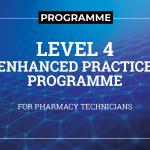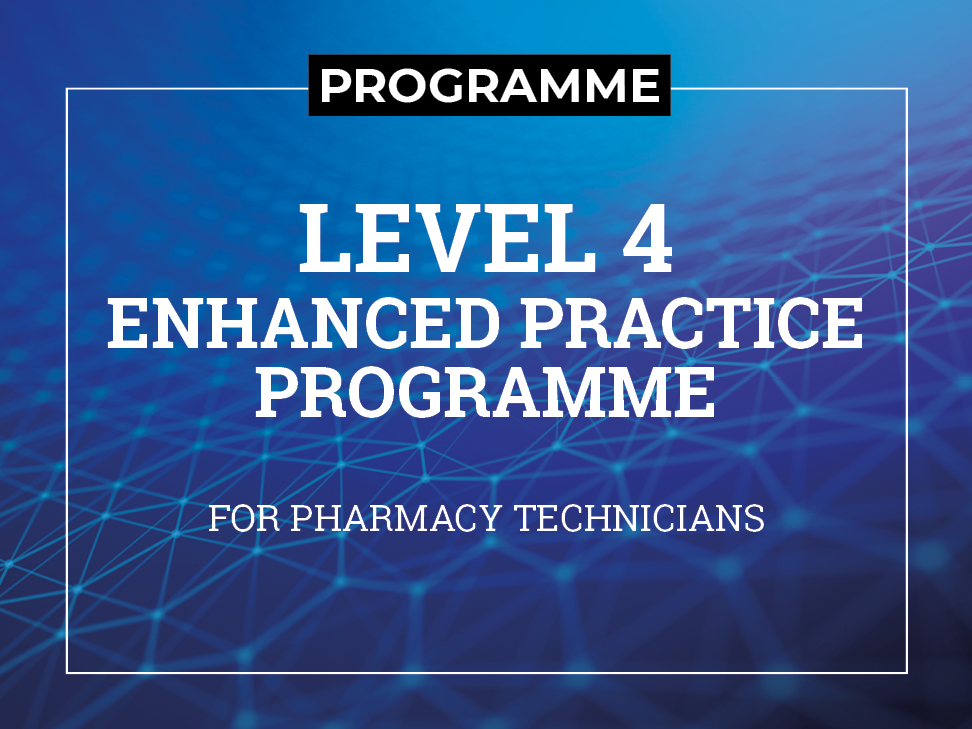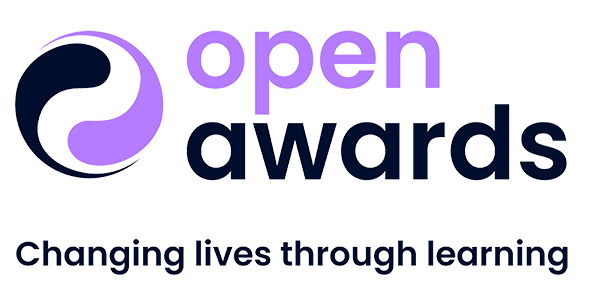Level 4 - Enhanced Practice Programme for Pharmacy Technicians
Entry Requirements for Learners
- Must be a GPhC registered pharmacy technician or working as a qualified pharmacy technician in Northern Ireland
- Must be working in a pharmacy environment for a minimum of 16 hours per week
- Must be able to commit 4 to 6 hours of study per week
- Must be able to attend online tutorials, virtual classrooms and, if applicable, residentials (see Unit Information for requirements)
- Must have access to IT facilities including internet access, audio and visual equipment
- Must have identified a workplace mentor
- Selected by the learner
- Is a pharmacy or other healthcare professional
- Does not have a significant or financially dependent relationship to the learner
- Works for the same employer as the learner
- Acts as a professional role model
- Can support the learner with signposting to resources
The Level 4 Enhanced Practice Programme is an opportunity for pharmacy technicians to develop knowledge and skills for enhanced practice roles. This post-registration programme supports a range of roles for pharmacy technicians across all pharmacy sectors, including, but not limited to:
- Dispensary and pharmacy managers
- Medicines management pharmacy technicians
- Technical services leads
- Optimisation pharmacy technicians
- Pharmacy procurement pharmacy technicians
- Pharmacy educational / supervisors / leads
- Managers
- Specialist pharmacy technicians
- Pharmacy service lead
The programme is delivered as a ‘pick and mix’ unit format across the full programme and several role specific pathways. The full programme will take 2-years to complete on a part-time basis commitment of 4-6 hours of study per week.
A blended learning model of teaching will be used to include online learning, independent research, individual and group tutorials, presentations from subject matter experts and peers and residentials (depending on unit options). The delivery model will utilise peers/networks and communities of practices as well as independent study.
The Level 4 Enhanced Practice Programme covers 11 units (mandatory and optional) covering the full programme and 6 pathways.
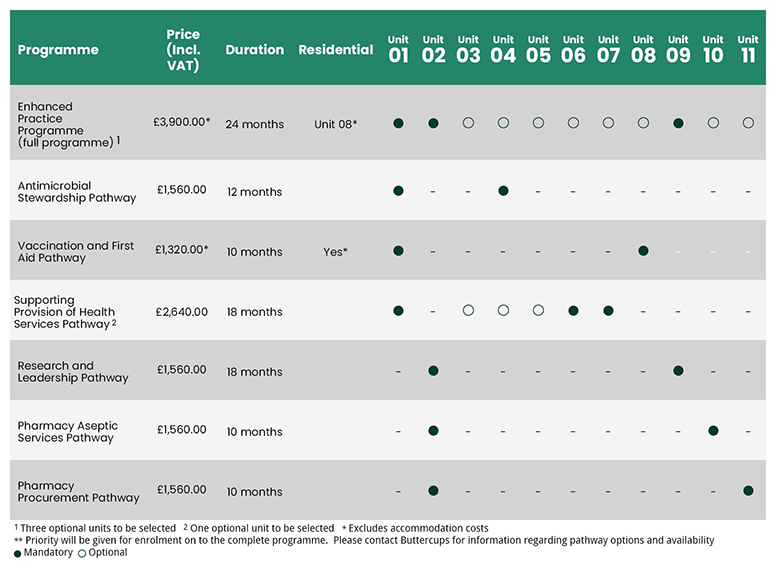
Please read our programme information pack before enrolling
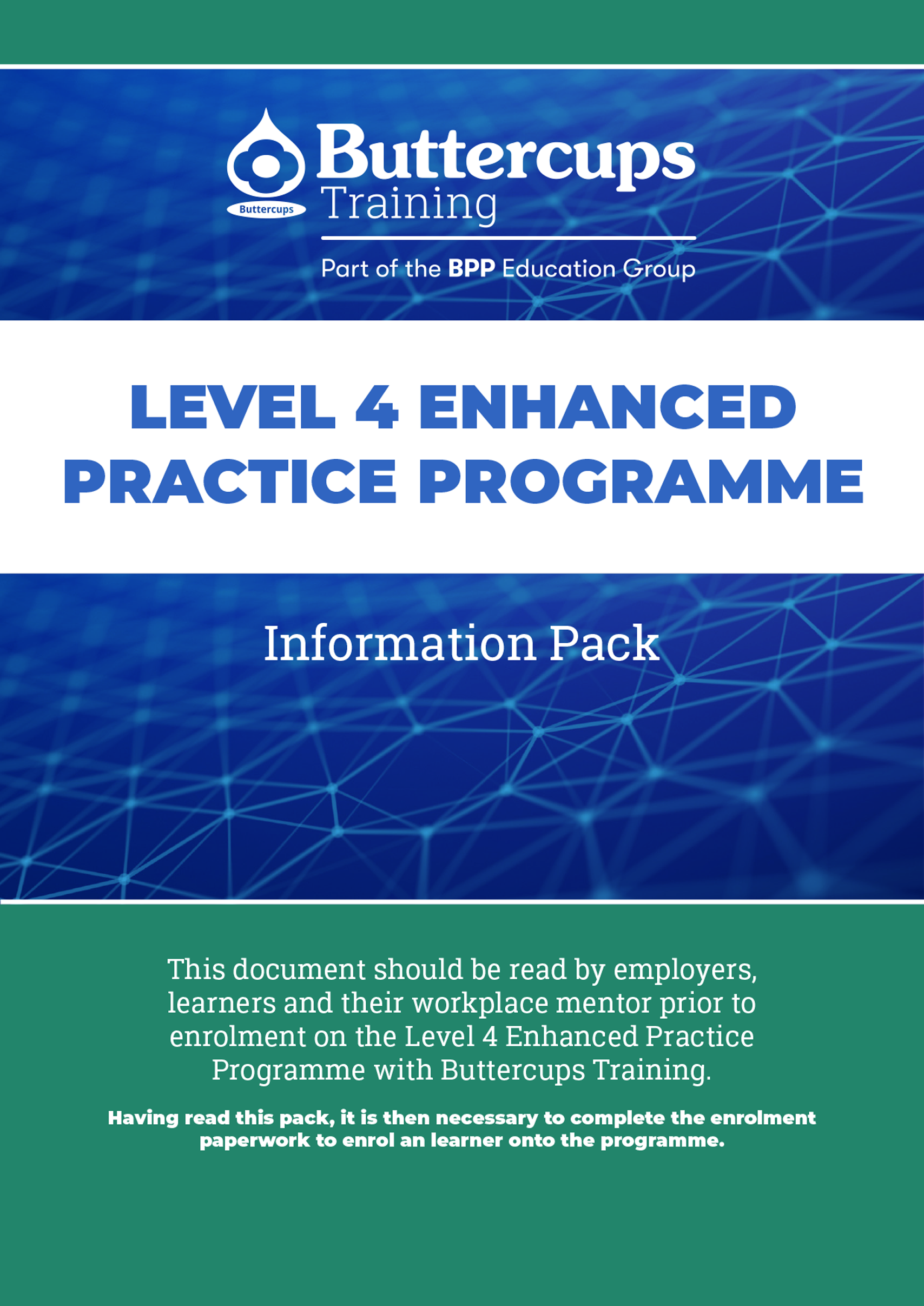
Download programme information pack
Unit information
Here you will find more detail on each of the Units.
This unit is mandatory for everyone on programme. It requires attendance and participation at a 90-minute online virtual classroom within the first 6-weeks of the start of the course. Several date options for this virtual classroom will be offered.
This unit is mandatory for the full programme, antimicrobial stewardship, vaccination and first aid and supporting provision of health services pathways.
It builds on communication skills obtain in initial training and supports those communicating with patients, colleagues, other healthcare professionals and members of the public.
It runs from month 1 to 6 and requires attendance at a 2-hour virtual classroom in month 5 or 6 for online participation in an OSCE assessment and provision of peer feedback. Learners will be offered a 30-minute, online personal tutorial within this unit to check in with a Buttercups tutor.
Learners can access optional drop-in sessions to discuss the programme or their work with a Buttercups tutor. A variety of dates and times will be on offer.
For further information on unit content and assessment see page 9 of the programme information pack.
This unit is mandatory for the full programme, research and leadership, pharmacy aseptic services and pharmacy procurement pathways.
It develops critical thinking skills and their application in professional judgements and supports those making decisions within the workplace. The assessment will be a presentation and debate on a work-based problem you have identified.
It runs from month 3 to 6 and requires attendance at a 2-hour debate virtual classroom in month 5 or 6. Learners not completing Unit 01 will be offered a 30-minute, online personal tutorial within this unit to check in with a Buttercups tutor.
Learners can access optional drop-in sessions to discuss the programme or their work with a Buttercups tutor. A variety of dates and times will be on offer.
For further information on unit content and assessment see page 10 of the programme information pack.
This unit is optional for the full programme and the supporting provision of health services pathway.
It develops clinical skills related to the chronic conditions of cardiovascular conditions, respiratory conditions, diabetes. Learners selecting this unit will need to have access to patients with these conditions to create case studies as part of the assessment.
It runs from month 7 to 12 or alternatively month 13 to 18. There are no virtual classrooms with this unit.
Learners can access optional drop-in sessions to discuss the programme or their work with a Buttercups tutor. A variety of dates and times will be on offer.
For further information on unit content and assessment see page 11 of the programme information pack.
This unit is optional for the full programme and the supporting provision of health services pathway. It is mandatory for the Antimicrobial Stewardship pathway.
It develops clinical skills related to antimicrobial infections. Learners selecting this unit will need to have access to patients with infections which must include bacterial infections, to create case studies as part of the assessment. You will also develop a antimicrobial resistance awareness campaign.
It runs from month 7 to 12 or alternatively month 13 to 18. Learners will be required to attend a 90-minute online, virtual classroom to present their antimicrobial campaign to their peers and a Buttercups tutor.
Learners can access optional drop-in sessions to discuss the programme or their work with a Buttercups tutor. A variety of dates and times will be on offer.
For further information on unit content and assessment see page 12 of the programme information pack.
This unit is optional for the full programme and the supporting provision of health services pathway.
It develops clinical skills related to the nervous system, musculoskeletal and renal conditions in the elderly (65 and over). Learners selecting this unit will need to have access to elderly patients with these conditions to create case studies as part of the assessment.
It runs from month 7 to 12 or alternatively month 13 to 18. There are no virtual classrooms with this unit.
Learners can access optional drop-in sessions to discuss the programme or their work with a Buttercups tutor. A variety of dates and times will be on offer.
For further information on unit content and assessment see page 13 of the programme information pack.
This unit is mandatory for the supporting provision of health services provision pathway and optional for the full programme.
It builds on consultation skills from initial training. Learners do not need to be working in a patient-facing role for this unit and can undertake the assessment from the unit learning.
It runs from month 5 to 10 or alternatively month 11 to 16. There are no virtual classrooms with this unit.
Learners can access optional drop-in sessions to discuss the programme or their work with a Buttercups tutor. A variety of dates and times will be on offer.
For further information on unit content and assessment see page 14 of the programme information pack.
This unit is optional for the full programme.
It provides learners with an understanding of screening and testing, the results and the impact on medicines optimisation. The unit accompanies the clinical skills units (03/04/05) very well.
Learners do not need to have access to patient screening and testing services and the assessment can be achieved from the learning within the unit.
It runs from month 7 to 10 or alternatively month 13 to 16. There are no virtual classrooms with this unit.
Learners can access optional drop-in sessions to discuss the programme or their work with a Buttercups tutor. A variety of dates and times will be on offer.
For further information on unit content and assessment see page 15 of the programme information pack.
This unit is mandatory for the vaccination and first aid pathway and optional for the full programme.
It provides learners with the underpinning knowledge and competency skills to become a vaccinator and first aider. Learners will be required to attend a 1-day practical workshop at Buttercups House, Nottingham (other locations may be available depending on numbers).
It runs from month 4 to 6 or alternatively month 10 to 12 (subject to change). There are no virtual classrooms with this unit.
Learners can access optional drop-in sessions to discuss the programme or their work with a Buttercups tutor. A variety of dates and times will be on offer.
For further information on unit content and assessment see page 15 of the programme information pack.
This unit is mandatory for the research and leadership pathway and the full programme.
It develops learners research skills by building on the learning from Unit 02. It requires learners to undertake a small research project and create a poster for presentation on the process and any outcomes. Learners will need to attend a 1-hour optional virtual classroom to discuss their research proposal and a 2-hour mandatory virtual classroom for their poster presentation assessment.
It runs from month 7 to 17 or alternatively month 13 to 23.
Learners can access optional drop-in sessions to discuss the programme or their work with a Buttercups tutor. A variety of dates and times will be on offer.
For further information on unit content and assessment see page 16 of the programme information pack.
This unit is mandatory for the aseptic services pathway and optional for the full programme.
It gives working examples of the implementation of legislation and regulation related to aseptic services within an NHS environment. Learners should be working for some of their role within aseptic services to undertake this unit as there is a requirement to reflect on a work-based issue in the assessment. There are no virtual classrooms with this unit.
It runs from month 5 to 8 or alternatively month 11 to 14.
Learners can access optional drop-in sessions to discuss the programme or their work with a Buttercups tutor. A variety of dates and times will be on offer.
For further information on unit content and assessment see page 17 of the programme information pack.
This unit is mandatory for the procurement pathway and optional for the full programme.
It gives working examples of the implementation of legislation and regulation related to pharmacy procurement. Learners should be working for some of their role within pharmacy procurement to undertake.
It runs from month 5 to 8 or alternatively month 11 to 14. Learners will need to attend a 1-hour professional discussion to discuss dealing with stock shortages.
Learners can access optional drop-in sessions to discuss the programme or their work with a Buttercups tutor. A variety of dates and times will be on offer.
For further information on unit content and assessment see page 18 of the programme information pack.
Frequently Asked Questions
You will need to commit an average of 4 to 6 hours per week for this programme.
You will need to be able to attend the virtual classrooms as described in the Unit section.
- Is a pharmacy or other healthcare professional
- Does not have a significant or financially dependent relationship to the learner
- Works for the same employer as the learner
- Acts as a professional role model
- Can support the learner with signposting to resources
This is cohort learning where you will network with other learners undertaking the same units as you. It is important you are working on the units at the same time to access the peer learning.
No, this programme is not accredited on the primary care national framework and is not equivalent to PCPEP. PCPEP may be a mandatory requirement for your job role, check with your manager before enrolling on this programme.
The pick and mix options of units and pathways makes this programme suitable for all pharmacy technician roles including those in primary care; secondary care - ward-based MMT roles, dispensary managers, those working in aseptic services and those in procurement; community pharmacy technicians providing medicines management/medicine optimisation to patients; care home pharmacy technicians and those working in health and justice sectors.
We feel this programme can support all pharmacy technician roles and sectors through optional unit selections and pathways.
We do not recommend this. Due to the cohort learning, selecting all 3 clinical skills units will mean that 2 units will run simultaneously. This will be a lot of work for a learner to undertake.
The assessment also requires the learner to source real patients with the conditions described in the clinical skills unit for case studies. Finding patients across all of the clinical skills conditions may be difficult.
You should select the clinical units for the conditions you observe the most in your job role. For example, if you work with the elderly, you should select Unit 05. If you work in an antimicrobial stewardship role or see patients with infections on a regular basis you should select Unit 04. If you work with patients with chronic conditions such as cardiovascular, respiratory conditions and diabetes you should select Unit 03. You may work with a variety of patients and should select a maximum of 2 clinical units.
If you are selecting Unit 03 (chronic conditions) or 04 (antimicrobials) Unit 07 is a good option to select with these units as it will cover the screening and testing used in these conditions.
If you are selecting Unit 05 (elderly care) Unit 06 is a good option to select with this unit as it will cover the use of enhanced consultation skills which is valuable with these patients.
You can select any combinations for the full programme, please check the unit information section to see more detail of the units and which combination will be best for you.
You will get support from a Buttercups tutor throughout your programme. The drop-in sessions will be hosted by variety of tutors all equally able to support you. You will complete a personal tutorial with a Buttercups tutor and this may be with a different tutor to your primary tutor due to your, and their, availability.
All tutors on this programme will be able to support your learning.


